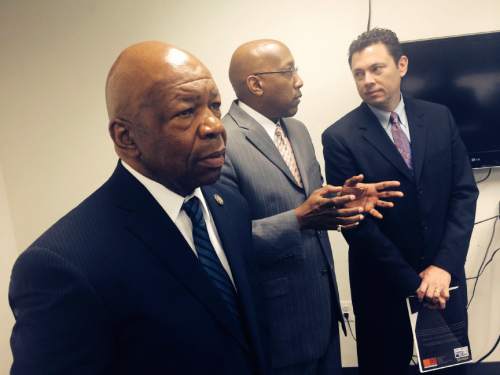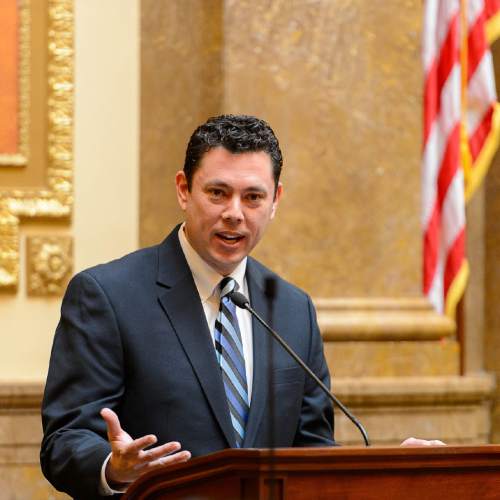This is an archived article that was published on sltrib.com in 2016, and information in the article may be outdated. It is provided only for personal research purposes and may not be reprinted.
Rep. Jason Chaffetz often leads the national GOP chorus bashing Hillary Clinton over the attack on the U.S. embassy in Benghazi, ripping federal funding for Planned Parenthood or pushing to impeach the IRS boss.
Despite such roles for the 49-year-old chairman of the often-in-the-spotlight House Oversight and Government Reform Committee, Chaffetz still sleeps on a cot in his office to save money. (He's on his second after the first broke in the middle of the night.)
He says it shows the fight, and frugality, that he hopes Utahns appreciate as he seeks a fifth term in Congress and faces challenger Chia-Chi Teng in the June 28 GOP primary.
"I want to make people proud," he says. "I want them to understand how hard I'm working to do the right thing."
He's a convert to the Republican Party — as well as to the LDS Church — and says he's traveled a long path into politics that he never would have imagined in his youth.
He grew up in California, Arizona and Colorado. In high school in Colorado, "I was a soccer-playing fool. In my junior year in high school, I was invited by the vice principal to come try out for the football team. They needed a kicker. I somehow turned myself into a really good kicker."
Arizona State University head coach Darryl Rogers offered him a scholarship. But when Rogers decided to leave and coach the NFL's Detroit Lions, he warned Chaffetz that ASU would not honor the offer.
"But he said he would help me get somewhere," Chaffetz says. "Somehow I had a conversation with [then-coach] LaVell Edwards, and the next thing I knew I was being recruited to go play for the national-champion BYU Cougars."
—
Hard work • Edwards remembers Chaffetz "had a strong leg for a guy with a slight build." He adds, "Kickers are a different breed," but he remembers Chaffetz as especially hardworking.
He says many kickers simply kick for a while, then lay off while other teammates go through more extensive drills. Chaffetz spent the entire practice working on his style and timing.
Chaffetz remembers that when he arrived at BYU, "Everyone assumed I was Mormon." He was not, but he would join The Church of Jesus Christ of Latter-day Saints at the end of his BYU career.
"I really didn't have religion in my life," he says. "Technically my dad was Jewish and my mom was Christian Scientist, but we never practiced anything but Halloween and Valentine's Day. We did Christmas, but it was just a day for presents."
Chaffetz jumped into politics, as a Democrat, while at BYU. He was the Utah co-chairman for Democratic presidential nominee Michael Dukakis' 1988 race against George H.W. Bush.
That was because of a family connection. Chaffetz's father, John, in a previous marriage was wed to Kitty Dickson. After they divorced, Kitty married Dukakis. "They asked me if I would help out. I said sure, but knew nothing about politics," he recalls. "But I did get to see the presidential race up close and personal. I did travel with them."
Edwards remembers distinctly that Chaffetz told others on his BYU team that he was a Democrat. "In Utah, it's probably wise that he switched," the former coach added.
After graduation, Chaffetz worked as an executive with Nu Skin — and it hosted Ronald Reagan in Utah for a couple of days, which led to Chaffetz becoming a Republican.
"I got to spend the better part of two days with him. That was impactful," he says. Chaffetz adds that at the time, he was newly married with children and he realized, "I was a very conservative person."
He adds, "When you are a young man, single and unmarried, it's a whole different perspective than when you're married, have a paycheck and you've got to figure out what FICA is all about." Still, he wasn't further involved in politics for another 15 years.
That changed when he heard that Jon Huntsman Jr. was considering running for Utah governor. Chaffetz's mother had just died of cancer at age 51, and Chaffetz had become impressed with the Huntsmans' work against cancer.
He says a mutual friend, Chuck Warren, arranged what was supposed to be a 10-minute meeting.
"It turned into 30 minutes, which turned into, 'Why don't you come back next week?' which turned into, 'Why don't you come to work for the campaign?' " Chaffetz was hired as communications manager, but six weeks later became the campaign manager.
"Then he won," Chaffetz says, "and he asked me to stay on as chief of staff."
In two years of that job, he says he saw "who was doing what and how" in Utah politics. "I thought, 'I think I can do this better than Chris Cannon,' " who then was a six-term Republican incumbent.
Chaffetz won enough votes in the state convention to force a primary election, and then he defeated Cannon, 60 percent to 40 percent — even though Cannon outspent him by a 6-to-1 margin.
That experience of knocking off a long-term congressman is not forgotten now that Chaffetz is the incumbent facing a newcomer in a primary.
"I don't take it for granted in any way, shape or form. It's an honor and privilege to serve," he says, adding that he wants to continue to earn that service.
—
Power player • Chaffetz has a bully pulpit as chairman of the Oversight Committee.
"There are only 18 authorizing committees in the House of Representatives," he explains. "So to be one of the chairmen who actually has the gavel and can set the agenda is very important to Utah, something I think we've shown great progress with."
He often has used that for political attacks, such as blasting Democrat Hillary Clinton over the Benghazi raid, going after Planned Parenthood (but backfiring when he used a misleading chart), and criticizing the Barack Obama administration over the Fast and Furious gun-running operation, targeting of conservative groups by the IRS and Secret Service scandals.
(The Secret Service recently announced it had disciplined 41 agents for reviewing private information related to a 10-year-old Chaffetz job application.)
But he has reached out to try to create some bipartisanship, such as when he and the committee's ranking Democrat, Rep. Elijah Cummings, D-Md., toured each other's districts to see their distinct problems and try to build bridges and find solutions.
Chaffetz last year even made a short-lived bid for U.S. House speaker when Republican turmoil prompted Ohio's John Boehner to step down.
Warren, Chaffetz's longtime friend, says he "is sincere in his desire to help people. That's why he's serving."
For example, he says Chaffetz recently heard about a shooting near Warren's home and knew that Warren was out of town. "He called and asked if he wanted me to pick up my wife and family. There was no reason for him to do that. He just cares."
Warren, a political fundraiser, adds that Chaffetz is perhaps the hardest-working politician he knows. "I don't know when he sleeps." Still, he says, Chaffetz recently took up wildlife photography and hiking. "It's like he runs a marathon every day. Maybe that's his way to take a break from everything: take a breath, have a drink of water and think about the marathon he just ran."
Chaffetz says he is continuing to campaign on the same four pillars that he used originally to seek office: fiscal discipline, limited government, accountability and a strong national defense. "Washington, D.C., is a mess, no doubt about it," he says. "But I'm an eternal optimist and I'm not giving up on this country or the process. ... But it's a fight every day."
He adds that his record is easy to examine, and "I've tried to be as open of a book as I possibly can, and accessible as I possibly can." That includes acting as his own spokesman and answering reporters' calls on his cellphone himself.
"I don't expect everyone to agree with every vote I've ever taken, but I want them to know how hard I'm working and am trying to do the right thing."





